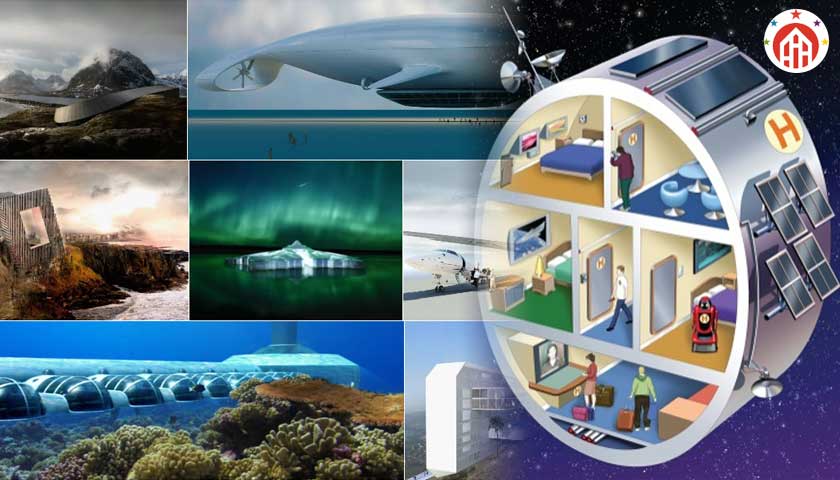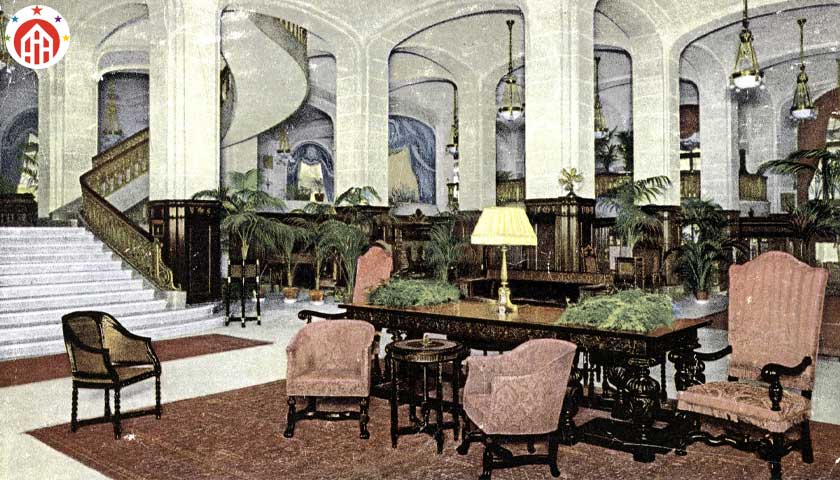Hotels of the future
What can we expect from the next generation of hospitality? E&T casts its gaze into the future to divine the most likely developments.
You already know what the hotel of the future looks like. It’s a pristine zero-g toroid hovering in orbit. It’s an undersea complex with glass walls facing azure depths. It’s a high-tech pod nestling in the Serengeti or a glamorous boutique B&B run by robots.
Scarcely a week goes by without the announcement of another such playhouse for jaded millionaires, usually accompanied by high-definition visualisations and predictions of holidays on the Moon. But behind the scenes, in the refurbished post-war chalets and anonymous chain hotels frequented by the rest of us, a quieter revolution is taking place.
‘Personalisation is going to be key,’ says Rohit Talwar, CEO of research firm Fast Future. ‘From the point of booking or even before, customers will say, ‘this is the room I want, this is the linen I want and the amenities in the bathroom’. Even down to, ‘here are pictures of my family, I want these on the digital photo frames on the walls’.’
Technology is on the verge of delivering the holy grail of hoteliers – making a room you are inhabiting for just a few hours feel as comfortable, familiar and practical as your own house. The temperature and lighting will be perfect and the entertainment options will mirror your domestic set-up, right down to the channels and music you enjoy. Even the furniture will be arranged just the way you like it, as though a legion of servants are predicting your every whim.
And that’s because they will be. Hotels are already starting to take advantage of converged networks, Internet protocol (IP) platforms that integrate everything from reservations and entertainment to utilities, staff allocation, surveillance and video-conferencing.
Take Hotel 1000 in Seattle, Washington. This high-end business hotel was one of the first to deploy a converged network. It uses fibre optic and Cat 5 cabling to link TV, phone and heating systems. ‘When we opened, we told our vendors that we would be their lab,’ says Chuck Marratt, vice-president of IT with MTM Luxury Lodging, Hotel 1000’s parent company. ‘We have beta-tested many a product here. We tested video-on-demand in high definition, Inncom energy systems, and we’re now thinking about set-top boxes with apps – the merging of TV with the Internet.’
Personal specifications
Step into a Hotel 1000 room today and entry and infrared sensors will register your presence, automatically adjusting the temperature to your preferred level. The (free) VoIP touchscreen phone is Internet-capable, with links to airlines for checking in, local weather forecasts and hotel information. The television can display your choice of ‘ambient video’ or access a library of films on demand.
Settle in for the evening and the minibar will know when it’s running low of peanuts and beer. Housekeeping will be automatically summoned to restock it – but not until the hotel senses you’ve left the room. Welcome to one of the biggest selling points of converged networks: no more intrusive knocks just when you’re getting out of the shower.
Marratt considers Hotel 1000 virtually future-proof: ‘Right now, we can take anything that’s IP-based and incorporate it into the guest room very easily. We’ve wired for it and we’ve planned ahead for it.’
However, being on the cutting edge comes with its own difficulties. ‘Keeping it going becomes an expensive proposition. Flatscreen TVs simply don’t last as long as traditional CRTs. We had to replace our original 40in TVs after just three years, as we started to move to HD. Another thing is getting these things to talk with each other.’
Hotel 1000 has put its weight behind Hotel Technology Next Generation (HTNG), a rapidly growing trade association that is setting standards for everything from XML messaging and network gateways to digital signage and the design of remote controls. ‘One thing the organisation really brought to life is Web services,’ says Marratt. ‘Now apps will be able to talk to other apps, so the registration system will be able to talk to the telephones, for example, and guests will see messages in their own language.’
This high-concept stuff may work well for luxury boutique residences but the vast majority of hotels are struggling to cope with the transition to a digital future.
‘People are bringing new generations of entertainment technology with them when they travel, and are looking for complementary systems such as flatscreen TVs and high-speed wireless broadband,’ says John Burns, president of Hospitality Technology Consulting. ‘The lust for bandwidth is fast-growing, expensive to satisfy and growing almost in orders of magnitude, year in, year out.’
What’s even more frustrating for hotel owners is that customers increasingly expect something for nothing. ‘Internet access will be expected by customers like heating and hot water,’ says Burns. ‘The general trend is that it cannot be charged for. There is an unstoppable movement towards inclusion of free Internet access.’
Burns is also sceptical that high-tech personalisation can be easily rolled out to the bigger hotel chains. ‘Personalisation is not easy to deliver. It’s not easy in terms of maintaining the data and not easy in terms of having someone on the ground to make the wishes come true. When you try to personalise a chain of a thousand properties, that’s a lot of arrivals to be catered for. And the more you promise, the more you risk.’
Technology-aided staff
One way to cut that risk is to put technology into the hands of the people who really need it. That might mean giving iPads to receptionists or putting smartphones in the rubber gloves of cleaners.
The winning product in the inaugural Most Innovative Hospitality Technology Award this year was the Rex Room Expeditor.
The Rex app runs on the Apple iPod Touch. It connects wirelessly to a hotel’s converged network and tells personnel the order in which rooms are to be cleaned. One hotel might choose to clean VIP rooms first, another might focus on making up rooms for customers with early check-in times. Rex can also incorporate personalised room preferences, and even deliver its instructions in the native language of the cleaning staff.
While that should make life easier for staff, the ultimate aim is to allow hotels to save money by employing fewer people. ‘Hotels can reduce their personnel if they use technology in smart ways. There’ll be a higher level of skill required in some areas to help people use the new facilities but you should reduce your overall staffing bill,’ says Rohit Talwar. One guest service interface, Intelity ICE, claims to reduce the time staff take dealing with customer requests by 80 per cent through automatically routing enquiries to the correct department.
Receptionists will be the first to go, predicts Talwar. ‘Unless you want it as a quaint personal experience, check in will be a thing of the past at most hotels,’ he says. ‘Whether it uses iris scanning or face recognition, the hotel will know who you are the moment you walk in. A lot of companies are looking at robots to clean bedrooms. They’ll be cheaper in the long run.’
Hotel 1000’s Chuck Marratt isn’t so sure: ‘We’re still in the hospitality business and personal service is very important. We could easily have recorded wake-up calls announcing the time and weather, but we opted for a human being. We want to be not just at the cutting-edge in technology, but at the cutting-edge in service, too.’
Even if hotels are happy to scale back on personal attention, they may find their support bills creeping up, warns Marratt. ‘In other hotels, technology can often be supported remotely. At Hotel 1000, we need to have two IT staff based in the hotel,’ he says. ‘When a guest calls down and says their TV isn’t coming on, it’s not enough for an engineer to simply come and fiddle with cables. We have to re-boot the set-top box.’
Green hotels
Another area of innovation is sustainability. Every hotel wants to reduce its energy and water bills and cut down on waste. This chimes well with an increasing awareness of green issues among travellers. However, don’t expect hotels to make as much fuss about their eco-initiatives, says Talwar. ‘Customers will get bored with hotels telling them that they’re green but we’ll also punish those that still haven’t got it right in 10 years’ time. We’ll vote with our feet.’
Tomorrow’s hotels will be awash with information. They may bare every aspect of their inner workings to the scrutiny of eco-sensitive guests or, like Hotel 1000, strive to fulfil visitors’ every need and unspoken desire. But as hotels get smarter, tracking us in and out of our rooms and personalising entertainment, there is a chance that they’ll come across like an over-pushy waiter.
‘One hotel chain boss told me, ‘our mantra is, don’t be creepy’,’ says John Burns. ‘In the past, hotels have been sensitive to customers’ wishes for privacy, sometimes even anonymity. If we delve too deeply into this pool of information, it may not be welcomed. There is a danger in being too smart.’
There’s also a risk in being too technologically sophisticated, says Marratt. ‘We have a broad group of people staying at our hotels. Some are happy using a touchscreen Internet phone and some are not – and we want everybody to be comfortable. We’ve made sure there is a high-tech way and a low-tech way to get everything done.’
Better still, what if a hotel could get rid of interface and technology worries altogether? Blow Up Hall 5050 is a boutique hotel in Poland that hands out iPhones. The mobiles guide guests to their room, grant access and come pre-loaded with handy ‘virtual concierge’ apps. Marratt can see a time when visitors’ own smartphones will integrate seamlessly with hotel’s converged networks.
‘We’re big on allowing you to use your own device to interact with the hotel,’ he says, ‘It’s cheap for us and guests won’t have to learn something new. Load up a Hotel 1000 app and, because it detects you’re here through GPS, you’ll be able to control everything in the room with your phone. No one has to teach you how to use anything – you already know it.’
So there it is. Forget floating airship inns, carbon-fibre capsule hotels and digital tree-houses. Hotel rooms of the future will be nothing more than a bed, a dumb flatscreen TV, free Wi-Fi and an app to download. Although if room service is brought up by a robot, you can be sure it will be an eco-friendly android that knows your name. *
By Mark Harris – eandt.theiet org – Published Monday, July 11, 2011





Five types of integration guests expect from the hotel of the future:
Curator: An integrator of experiences
The curator integrates external partnerships to keep hospitality fresh and make guest experiences relevant. As curator, hotels can offer a variety of environments that support the mood and mindset guests want, delighting guests through choice and the ability to explore new hotel experiences.
Matchmaker: An integrator of people
The matchmaker reimagines guests as having an equal role in building personal connections with the hotel brand and between guests. A matchmaker extends and deepens relationships with guests by creating a culture around the brand and allowing the brand to be defined by the network of guests. Matchmakers draw on the current strengths of hotels—like space and hospitality—to build a compelling network of guests that attract more business.
Neighbor: An integrator of cultures
The neighbor expands the hotel into the community and engages locals. It’s a destination for hotel guests and locals, but it’s more than a portal to the local culture—it’s an active participant in the community, a good neighbor that fits into its surrounding context. The neighbor integrates by merging global brands with local cultures. This requires adapting to context while maintaining an overall branded experience and service.
Architect: An integrator of spaces
The architect uses and repurposes spaces and assets. Rather than thinking of a single building in a single location for a single purpose, the architect maximizes space and resources to think outside that box—quite literally. The architect integrates multi-purpose spaces within and outside the single hotel to offer a completely new level of flexibility to guests, while serving new customers. It’s reimagining hotels beyond heads and beds.
Choreographer: An integrator of processes
The choreographer focuses on everything but physical space and real estate assets. It’s the virtual concierge and the logistics guru. The choreographer integrates services and businesses to act as the nexus of the travel industry—and delivers a seamless and convenient experience for the business traveler.
Technology innovations, changing customer demands, and new competitive threats are pushing hotels to offer increasingly personal, uniquely tailored experiences for every guest on every visit.